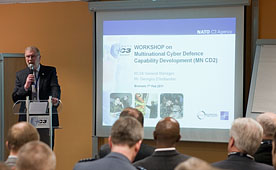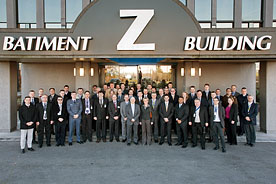NATO Nations to boost cyber defence cooperation
In line with Secretary General Rasmussens’s call for smart, modern defence, senior representatives from NATO Nations met on 7 February at the NATO Consultation, Command and Control Agency (NC3A) to discuss boosting multinational cooperation in the area of cyber defence.

The aim of the session was to chart multinational projects that would allow NATO member states to further enhance their cyber defence capabilities in a collaborative, cost-effective manner by establishing joint projects.
Areas discussed included improved information-sharing on rapidly emerging threats, new technologies and capabilities; and joint acquisition of Computer Incident Response and cyber defence situational awareness capabilities.
The workshop was held as a follow-up to the Lisbon Summit decisions and the high-level cyber defence meeting held at NATO Headquarters on 25 January. It was opened by Ambassador Gabor Iklody, NATO Assistant Secretary General for Emerging Security Challenges.

“NC3A has been involved in cyber defence projects since their inception in NATO. By facilitating the establishment of multinational projects in cyber defence, Nations will be able to leverage the expertise gained through our work on NATO common funded activities,” said Georges D’Hollander, NC3A General Manager.
Cost-effective development of national capabilities

The NC3A is responsible for the improvement and acquisition of NATO’s cyber defence capabilities. The Alliances is currently significantly upgrading its cyber defences, with the enhanced capabilities due to be up and running in 2012.
